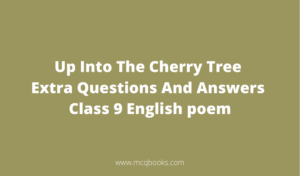Up Into The Cherry Tree Extra Questions And Answers Karnataka Board Class 9 English Poem
English is a difficult subject for many people to learn. Some students may become frustrated and give up, but here’s Up Into The Cherry Tree Extra Questions And Answers Karnataka Board Class 9 English Poem to help you maintain your momentum! This Up Into The Cherry Tree Extra Questions And Answers will provide all necessary information needed in order to study KSEEB Class 9 English successfully at home or school; it includes detailed grammar rules with examples that were used during today’s class discussion on the Karnataka Board English Exam.
The Up Into The Cherry Tree Extra Questions And Answers in English Chapter 3, Karnataka Board Class 9 makes it easier to understand the story. Understanding every detail of a story is important for scoring higher on an exam and expert writers have made sure that you know how everything flows together by summarizing perfectly!

Extra questions:
Why does the child want to climb a higher tree?
Ans: Betty did lots of hard work and dedication. Due to that she won the gold medals. That was the ultimate glory.
The garden next-door is covered with:
A) Flowers
B) Thorns
C) Fruits
D) Dry leaves
Choose the correct option.
Ans: A) Flowers.
The child wants to see where the roads lean into the:
A) Next town
B) Shore
C) Fairy Land
D) None of the above.
Choose the correct option.
Ans: C) Fairy Land.
About the poet:
Robert Louis Stevenson was born in 1850 in Edinburg, Scotland. He was one of the most popular Scottish writers. He wrote many poems, plays, short stories and novels. Also, he is best known for his adventure novels and travel essays.
He finished his schooling in 1857 at Mr Henderson’s School. He has also attended the University of Edinburg.
Some of his most popular works include “Treasure Island” (1883), “Kidnapped” (1886), “Strange Case of Dr Jekyll and Mr Hyde” (1885), “A Child’s Garden of Verses” (1885), “The Merry Men” (1882), “The Isle of Voices” (1892), “Underwoods” (1887), “The Amateur Emigrant” (1895) and “The Old and New Pacific Capitals” (1882) and a lot more.
Stevenson passed away in Vailima, Samoa on December 3rd, 1894 at a very young age of just 44.
About the poem:
This poem is about a child who has climbed a tree and is enjoying the beautiful nature from up there. The child has described everything in detail, about what he could see from high above the tree.
Structure of the poem:
“Up into the cherry-tree
Who should climb but little me?
I held the trunk with both my hands
And looked abroad on foreign lands.
I saw the next-door garden lie,
Adorned with flowers, before my eye,
And many pleasant places more
That I had never seen before.
I saw the dimpling river pass
And be the sky’s blue looking-glass;
The dusty roads go up and down
With people tramping in to town.
If I could find a higher tree,
Farther and farther I should see,
To where the grown-up river slips
Into the sea among the ships.
To where the roads on either hand
Lead onward into fairy land,
Where all the children dine at five,
And all the playthings come alive.”
The specific rhyming pattern in the poem is AABB CCDD EEFF GGHH IIJJ.
Line by line analysis of the poem:
Stanza 1:
“Up into the cherry-tree
Who should climb but little me?
I held the trunk with both my hands
And looked abroad on foreign lands.”
The child shows his excitement to climb the cherry tree and look at the world from there. He held the trunk of the tree with his little hands and climbed it. Reaching up there, he looked around. He looked at the faraway lands as well.
Stanza 2:
“I saw the next-door garden lie,
Adorned with flowers, before my eye,
And many pleasant places more
That I had never seen before.”
The child could see the garden of his neighbouring house. The garden was beautifully decorated with flowers. The view was pleasant. The child exclaimed that he had never seen something as beautiful as the garden filled with flowers before.
Stanza 3:
“I saw the dimpling river pass
And be the sky’s blue looking-glass;
The dusty roads go up and down
With people tramping in to town.”
Sitting high up on the tree, he also saw the river pass. The blue sky looked amazing from there. The roads looked as if they went up and down. He also saw people walking down the streets, probably going to the town.
Stanza 4:
“If I could find a higher tree,
Farther and farther, I should see,
To where the grown-up river slips
Into the sea among the ships.”
In the fourth stanza, the child says how he wishes that there was a higher tree. Had there been one, he would climb it as well and seen farther. He would also try to figure out the point where the river meets into the sea.
Stanza 5:
“To where the roads on either hand
Lead onward into fairy land,
Where all the children dine at five,
And all the playthings come alive.”
This is continuity to the last stanza. He says that if could climb a higher tree, he would locate where the roads end and meet into a fairy land. He basically feels that his imaginations might come true if he could look farther. May be at some place children would finish their meals at five and toys and playthings would come alive. He wanted to see these events if he climbed a higher tree.